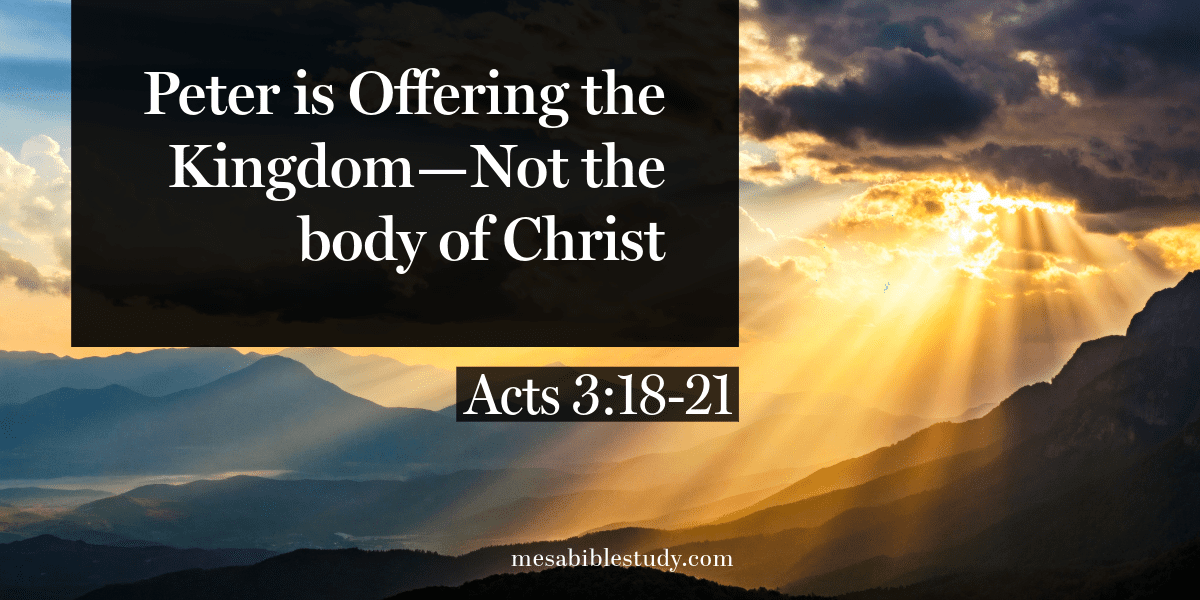🚨 Read This First
This post will clearly show that Peter is preaching to Jews only—proclaiming the gospel of the kingdom, not the gospel of salvation by grace alone apart from the Law.
The distinction could not be more clear than right here in Acts 3. The audience is Israel, the message is Israel’s repentance, and the promised outcome is the return of their Messiah to establish His kingdom on earth.
Most of Christendom has gotten this wrong! The language and the context of Scripture leave no room for twisting—Peter is not preaching Paul’s gospel here, and the Body of Christ is nowhere in sight.
But those things which God foretold by the mouth of all His prophets, that the Christ would suffer, He has thus fulfilled. Repent therefore and be converted, that your sins may be blotted out, so that times of refreshing may come from the presence of the Lord, and that He may send Jesus Christ, who was preached to you before, whom heaven must receive until the times of restoration of all things, which God has spoken by the mouth of all His holy prophets since the world began.
Acts 3:18-21
📜 Background, Setting & Purpose
✍️ Author:
Luke, the beloved physician (Colossians 4:14)
👥 Written To:
Primarily to give Theophilus (Acts 1:1) and early believers an orderly account of the Acts of the Apostles. This section specifically records Peter preaching to the men of Israel (Acts 3:12) in Jerusalem.
⏲️ When:
Shortly after Pentecost, likely AD 30–31.
🌍 Setting & Purpose of Acts 3:
Peter has just healed a lame man at the temple gate (Acts 3:1–10), causing amazement among the crowd. Seizing the moment, Peter preaches—not a mystery gospel revealed to Paul—but the gospel of the kingdom foretold by the prophets.
Here, Peter calls Israel to repent so that God may send the Messiah back and usher in the promised times of refreshing (Millennial Kingdom). There is no Church Age language here—only the continued prophetic program with Israel still in view.
🔍 Acts 3:18–21
18 But those things which God foretold by the mouth of all His prophets, that the Christ would suffer, He has thus fulfilled.
19 Repent therefore and be converted, that your sins may be blotted out, so that times of refreshing may come from the presence of the Lord,
20 and that He may send Jesus Christ, who was preached to you before,
21 whom heaven must receive until the times of restoration of all things, which God has spoken by the mouth of all His holy prophets since the world began.
✨ Phrase-by-Phrase Breakdown
“But those things which God foretold by the mouth of all His prophets…”
- Peter roots his message in prophecy, not mystery revelation.
- “All His prophets” refers to Old Testament prophecy concerning the Messiah’s suffering (Psalm 22, Isaiah 53, etc.).
- This is still the prophetic timeline—no break, no hidden truths revealed.
“…that the Christ would suffer, He has thus fulfilled.”
- Peter declares the suffering of Christ as fulfilled prophecy—not a new doctrine.
- Notice: There’s no mention yet of the Body of Christ, Jew/Gentile unity, or salvation apart from Israel’s rise.
“Repent therefore and be converted…”
- Kingdom gospel call to national repentance.
- This echoes Jesus’ earthly ministry to Israel: “Repent, for the kingdom of heaven is at hand” (Matthew 4:17).
- Peter is not offering a personal, individual gospel of grace; he’s calling Israel as a nation to turn.
“…that your sins may be blotted out…”
- This forgiveness is conditioned upon national repentance—in contrast to Paul’s gospel, where forgiveness is received instantly by faith alone in the finished work of Christ (Ephesians 1:7).
“…so that times of refreshing may come from the presence of the Lord…”
- “Times of refreshing” = prophetic language for the Millennial Kingdom (Isaiah 35, Isaiah 61).
- Peter links Israel’s repentance directly to the return of Christ to establish His kingdom.
“…and that He may send Jesus Christ, who was preached to you before…”
- If Israel repents, God will send the Messiah back.
- This is the exact opposite of the current Church Age reality, where Christ’s return (rapture) is not contingent on Israel’s repentance.
`
“…whom heaven must receive until the times of restoration of all things…”
- Christ remains in heaven until Israel fulfills the condition of repentance.
- “Restoration of all things” = restoring Israel to her covenanted position in the Kingdom (Amos 9:11–15, Isaiah 2:1–4).
“…which God has spoken by the mouth of all His holy prophets since the world began.”
- Again, Peter is drawing entirely from prophecy since the world began—the opposite of Paul’s mystery gospel, which was kept secret since the world began (Romans 16:25).
❌ What This Passage Does Not Mean
- It does not teach the beginning of the Church, the Body of Christ.
- It does not reveal the mystery gospel of grace—no mention of salvation by faith apart from Israel’s covenants.
- It does not place Gentiles on equal footing with Jews—Gentiles are still outside the prophetic program here.
✅ What It Does Mean
- Peter is still offering the prophetic kingdom to Israel, contingent on their national repentance.
- The Millennial Kingdom is ready to be ushered in if Israel responds.
- The early chapters of Acts are still within Israel’s program—Paul’s mystery gospel is not yet revealed.
🙏 Summary
Acts 3:18–21 is a kingdom gospel message rooted in prophecy, offered to the nation of Israel.
Peter is clear: if Israel repents, the Messiah will return, sins will be blotted out, and the Kingdom will be established. This is still the same prophetic hope spoken since the world began.
The Church, the Body of Christ, is not yet in view. That revelation would come later—after Israel’s continued rejection, after the stoning of Stephen, and after the conversion of Saul of Tarsus, who became Paul, the apostle of the Gentiles (37-40AD).
This passage is a dividing line for anyone who wants to understand the Bible—divided rightly. Until Paul, Israel’s prophetic program is still center stage.


0 Comments